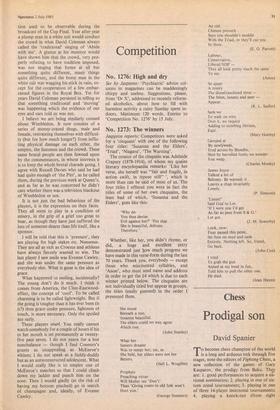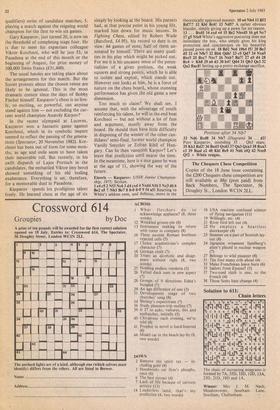Chess
Prodigal son
David Spanier
io become chess champion of the world ts a long and arduous trek through five stages, note the editors of Fighting Chess, a new collection of the games of Gary Kasparov, the prodigy from Baku. They are: I. good performances to acquire a na- tional nomination; 2. playing in one of six- teen zonal tournaments; 3. playing in one of three 14-player interzonal tournaments; 4. playing a knock-out (from eight
qualifiers) series of candidate matches; 5. playing a match against the reigning world champion for the first to win six games.
Gary Kasparov, just turned 20, is now on the threshold of completing stage four. He is due to meet his expatriate colleague Viktor Korchnoi, who will be just 53, in Pasadena at the end of this month or the beginning of August, for prize money of 100,000 Swiss francs (£31,400).
The usual hassles are taking place about the arrangements for this match. But the Soviet protests about the chosen venue are likely to be ignored. This is the most dramatic contest since the days of Bobby Fischer himself. Kasparov's chess is so live- ly, so exciting, so powerful, can anyone stand against him — not excluding the cur- rent world champion Anatoly Karpov?
In the recent olympaid at Lucerne, Kasparov won a fantastic game against Korchnoi, which in its symbolic import seemed to reflect the passing of the genera- tions (Spectator, 20 November 1982). Kor- chnoi has been out of form for some mon- ths, as age and exile seem to have taken their inexorable toll. But recently, in his swift dispatch of Lajos Portisch in the candidates, the embattled Viktor (my hero) showed something of his old boiling exuberance. Everything is set, therefore, for a memorable duel in Pasadena.
Kasparov spends his prodigious talent freely. He learned chess at the age of six
simply by looking at the board. His parents had, at that precise point in his young life, marked him down for music lessons. In Fighting Chess, edited by Robert Wade (Batsford, £4.95), his record to date is on view: 64 games of note, half of them an- notated by himself. There are many quali- ties in his play which might be picked out. For me it is his uncanny sense of the poten- tialities of a given position, the weak squares and strong points, which he is able to isolate and exploit, which stands out. However one looks at him, he is a force of nature on the chess board, whose stunning performance has given the old game a new
dimension.
Too much to claim? We shall see. I assume that, with the advantage of youth reinforcing his talent, he will in the end beat Korchnoi — but not without a lot of fuss and argument, mostly away from the board. He should then have little difficulty in disposing of the winner of the other can- didates' semi-final, former world champion Vassily Smyslov or Zoltan Ribli of Hun- gary. Can he then vanquish Karpov? Let's leave that prediction until nearer the time. In the meantime, here is a nice game he won at the age of 11, showing the way of the future.
Einorts — Kasparov: USSR Junior Champion- ship, 1975; Sicilian.
1 e4 c5 2 Nf3 Nc6 3 d4 cxd 4 Nxd4 Nf6 5 Nc3 d6 6 Bet e5 7 Nb3 Bel 8 0-0 0-0 9 f4 a5! Reacting to White's seldom seen, and dubious, move in the
theoretically approved manner. 10 a4 Nb4 n Bf3 Bd7!? 12 Khl 113e61 13 Nd5? A rather obvious blunder, simply giving up a pawn for no reason. 13 ... Bxd5 14 exd e4 15 Bet Nbxd5 16 g4 Nc7 17 g5 Nfe8 White's aggressive posturing does not intimidate the boy, who simply gives his king protection and concentrates on his beautiful passed pawn on e4. 18 Bd2 Ne6 19h4 f5! 20 Be3 d5 21 c4 N8c7 22 Bb6 Qd6! 23 c5 Qd7 24 NxaS BxcS 25 Bxc7 Nxc7 26 Nxb7 Ba7! 27 a5 d4 28 Bc4 + Kh8 29 a6 d3 30 b4? Qd4 31 Qb3 Qe3 32 Qa2 RacS! Setting up a pretty exchange sacrifice.
Position after 34 Nb7
33 Nd6 Rcd8 34 Nb7 (Diagram) 34 d2!
Pure Kasparov, intending 35 Qh3 mate.
35 Kh2 Rd31 36 Bxd3 Qxd3 37 Qa3 Qxa3 38 Rxa3 e3 39 Rant e2 40 Khl Re8 41 Nd6 elQ 42 Nxe8 Qf2 + White resigns.







































 Previous page
Previous page